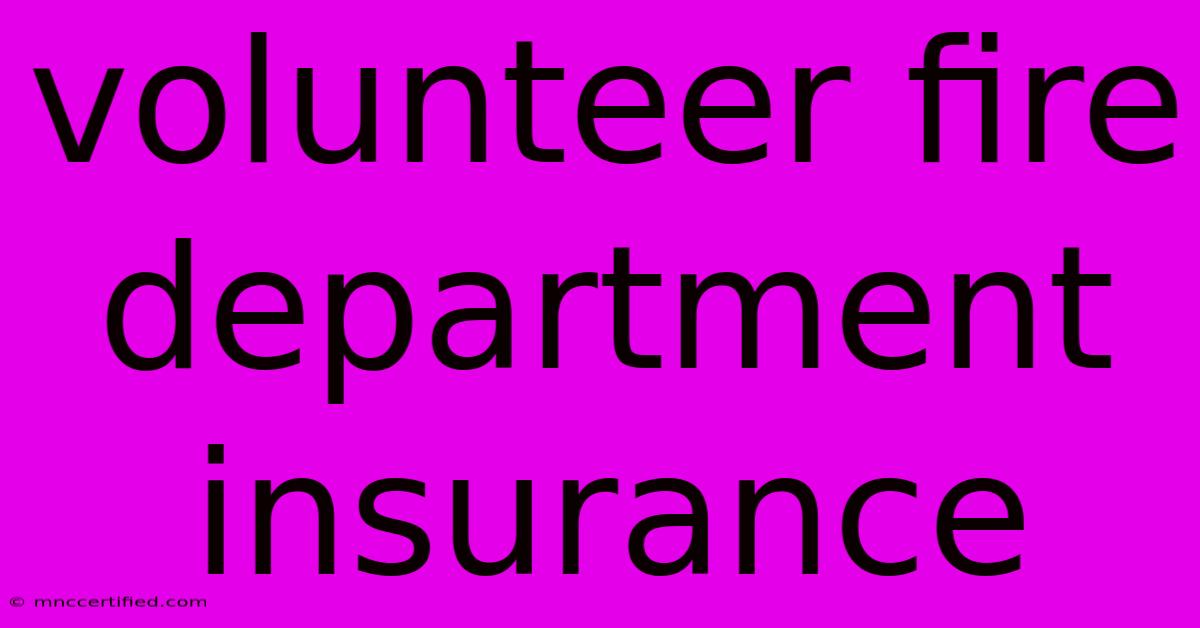Volunteer Fire Department Insurance

Table of Contents
Protecting Your Heroes: Understanding Volunteer Fire Department Insurance
Volunteer firefighters are the backbone of many communities, dedicating their time and skills to keep us safe. But just like any organization, volunteer fire departments need proper insurance coverage to protect themselves from financial ruin in case of an accident or liability claim.
This article delves into the crucial aspects of volunteer fire department insurance, explaining the types of coverage needed, key factors to consider, and tips for securing the best possible protection.
Why is Volunteer Fire Department Insurance Essential?
Volunteer fire departments face unique risks that necessitate specialized insurance coverage. These risks include:
- Liability: Accidents during firefighting operations, property damage during training exercises, or injuries sustained by members while on duty can lead to lawsuits and substantial financial burdens.
- Property Damage: Fire stations and equipment, like fire trucks and hoses, are expensive assets that need protection from damage or theft.
- Workers' Compensation: Volunteer firefighters are often considered employees of the department, requiring coverage for work-related injuries or illnesses.
Without adequate insurance, a volunteer fire department could face significant financial losses that could cripple their ability to operate and serve their community.
Types of Insurance for Volunteer Fire Departments
Understanding the different types of insurance crucial for your department is essential:
1. General Liability Insurance: This coverage protects your department from claims of negligence or bodily injury to third parties, including:
- Property damage: If your department accidentally damages someone's property while responding to a fire or during training.
- Personal injury: If someone is injured while on your fire station property or during a fire department activity.
- Advertising injury: If your department is accused of libel, slander, or copyright infringement.
2. Property Insurance: This policy covers physical damage to your department's property, such as:
- Fire station: Protection against fire, windstorm, vandalism, and other perils.
- Fire trucks and equipment: Coverage for damage or theft of vehicles and equipment.
- Contents: Protection for valuable equipment, tools, and supplies within the fire station.
3. Workers' Compensation Insurance: This coverage provides medical benefits and lost wages to firefighters who sustain work-related injuries or illnesses. It is crucial for ensuring your members receive the care and support they need.
4. Auto Insurance: Fire trucks and other vehicles used by the department need specific insurance policies that cover:
- Liability for accidents: Protecting the department from claims related to damage or injuries caused by its vehicles.
- Collision and comprehensive coverage: Protection for damage to the vehicle itself, whether caused by an accident, fire, or other perils.
5. Errors and Omissions (E&O) Insurance: This policy protects your department from claims alleging negligence in providing services. It can be especially important if your department offers fire safety inspections or other services to businesses or individuals.
6. Cyber Liability Insurance: In today's digital world, protecting your department from cyberattacks and data breaches is critical. This coverage can provide financial assistance for:
- Data breach response: Helping to manage a data breach, including notification costs and legal expenses.
- Cyber extortion: Covering costs related to ransomware attacks.
Factors to Consider When Choosing Insurance
1. Size and Scope of Operations: Departments with larger membership and more active operations may need higher coverage limits.
2. Risk Profile: The types of incidents your department responds to, training exercises, and the condition of your equipment can influence your insurance needs.
3. Budget: Insurance premiums can vary depending on coverage levels and the insurance provider.
4. Insurance Company Reputation and Experience: Choose a reputable insurance company with a track record of working with volunteer fire departments.
5. Customer Service and Claims Handling: Make sure the insurance company offers responsive customer service and efficient claims processing.
Tips for Securing the Best Volunteer Fire Department Insurance
1. Research Thoroughly: Compare quotes from multiple insurance providers and carefully review policy details.
2. Seek Professional Advice: Consult with an insurance broker specializing in volunteer fire department coverage.
3. Maintain Good Risk Management Practices: Implement safety protocols, conduct regular training, and maintain equipment to reduce risks and potential claims.
4. Stay Informed: Review your insurance policies regularly, update them as needed, and stay informed about changes in regulations and industry best practices.
5. Advocate for Your Needs: Don't be afraid to ask your insurance company for clarification or to negotiate coverage options.
Conclusion
Investing in the right insurance coverage is essential for the financial health and long-term sustainability of your volunteer fire department. By understanding the types of policies needed, considering key factors, and following these tips, your department can secure the protection it needs to continue serving your community with confidence.

Thank you for visiting our website wich cover about Volunteer Fire Department Insurance. We hope the information provided has been useful to you. Feel free to contact us if you have any questions or need further assistance. See you next time and dont miss to bookmark.
Featured Posts
-
Late Curry Explosion Leads Warriors To Victory
Nov 13, 2024
-
Benny Blanco More Than Just A Hitmaker
Nov 13, 2024
-
Life Insurance For College Students
Nov 13, 2024
-
Nba Cup How To Watch And Betting Odds
Nov 13, 2024
-
China Critics Rubio In Line For Trump Post
Nov 13, 2024